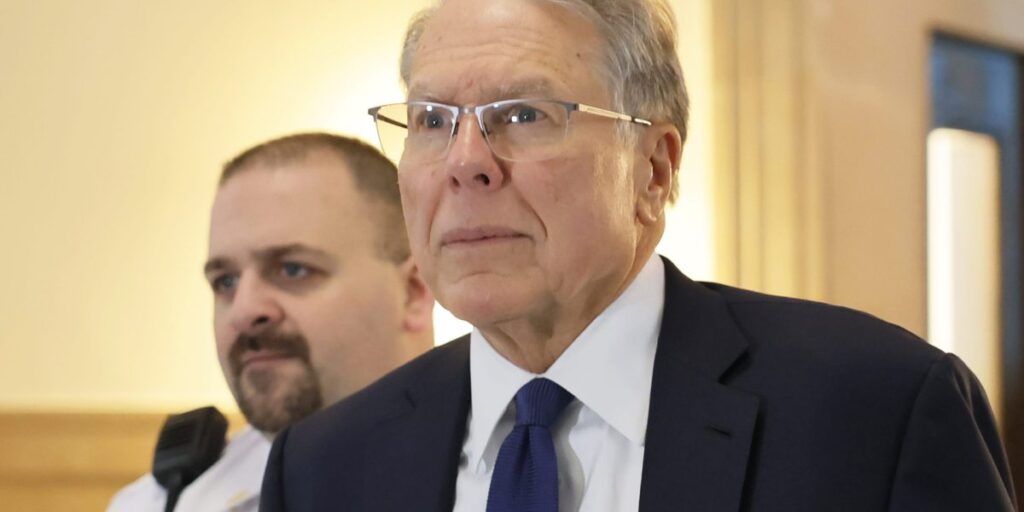
Wilson “Woody” Phillips, the National Rifle Association’s former financial czar, has been banned from managing funds for any nonprofit company in New York for ten years, the state’s attorney general said Tuesday.
Phillips agreed to the ban in May, three months after a jury found him involved in a scheme to embarrass the influential gun rights group Longtime NRA CEO Wayne LaPierre to finance his lavish lifestyle. Details of the settlement were not released until Tuesday.
Under the agreement, Phillips is prohibited from serving as a trustee for New York nonprofits for 10 years and must undergo training before returning to any such position. He remains liable to the NRA for $2 million for concealing and facilitating LaPierre’s lavish spending on exotic vacations and trips on private jets and superyachts.
The settlement means the now-retired Phillips will not have to participate in the second phase of a trial next week in a civil lawsuit brought by New York Attorney General Letitia James against the NRA and former executives.
Manhattan Judge Joel Cohen will begin deciding remaining issues in the case on July 15, including whether former LaPierre and former general counsel John Frazier should be barred from joining charitable organizations in the state.
Among other things, Phillips is accused of approving invoices for LaPierre’s private jet flights to the Bahamas; facilitating payments to contractors owned by LaPierre’s friends; and allowing the National Rifle Association to pay its longtime advertising agency Ackerman McQueen paid for travel, makeup and other expenses for LaPierre and his wife.
“Wilson Phillips oversaw and allowed the NRA’s financial mismanagement and corruption for decades, which is why the jury found him, the NRA and his co-defendants, senior executives Wayne LaPierre and John Frazier should be held accountable for their inappropriate conduct,” James said in a statement. She said Phillips’ ten-year ban “should serve as an example that my office will hold accountable anyone who participates in the abuse of power or misappropriation of funds.”
A message seeking comment was left with Phillips’ attorney.
NRA attorney William A. Brewer III said in a statement, “Today’s announcement misrepresents the record and illustrates the New York Attorney General’s motives: to advance his own interests rather than The interests of NRA members she claimed to protect.
“Importantly, the settlement agreement does not ensure that the jury awards Mr. Phillips monetary relief to the NRA because of Mr. Phillips’s participation in a scheme to harm the association. Unfortunately, the agreement does little to recover what Mr. Phillips is owed.” Millions of dollars don’t do anything,” Brewer said.
The first phase of the trial ended in February, when a jury in Manhattan state court found that LaPierre had misused millions of dollars in NRA funds. The jury said LaPierre must repay nearly $4.4 million to the NRA, while Phillips is owed $2 million.
Jurors found Frazier violated his duties, but did not say he owed any money and there was no reason to remove him from the organization. They also found that the NRA failed to properly manage its assets, omitted or misrepresented information in tax filings and violated whistleblower protections under New York law.
A third co-defendant, LaPierre’s former chief of staff Joshua Powell, settled with James’ office before the trial began in January. Powell, who wrote about “shocking” waste and corruption in his 2020 book “Inside the NRA,” agreed to testify at the trial, pay the NRA $100,000 and give up further involvement in the nonprofit.
LaPierre announced his resignation on the eve of the trial. In May, the NRA elected Doug Hamlin, its executive director of publications, to succeed him. Frazier, meanwhile, was removed from his position as general counsel but remains as the NRA’s corporate secretary. Phillips retired in 2018.
James sued the NRA and its executives in 2020, authorizing her to investigate nonprofits registered in the state. She initially sought to disband the entire organization, but Cohen ruled in 2022 that the charges did not constitute a “corporate death sentence.”
The trial casts a spotlight on the powerful lobby’s leadership, organizational culture and finances. giant.
In the second phase of the trial, James is seeking the appointment of an independent monitor to oversee the NRA’s management of the charity’s assets.
James is also seeking to bar LaPierre from holding a leadership role in any charitable organization operating in New York, and wants the NRA and Frazier to be barred from raising funds on behalf of any charity operating in the state.
“New Yorkers should know that when they support a nonprofit, those donations will be used to advance its mission and not be wasted on lavish benefits for employees or cronies,” James said.
__
Associated Press reporter Anthony Izaguirre in Albany, New York, contributed to this report.

